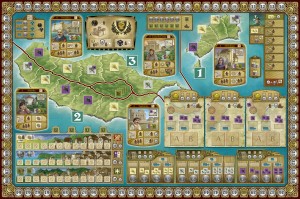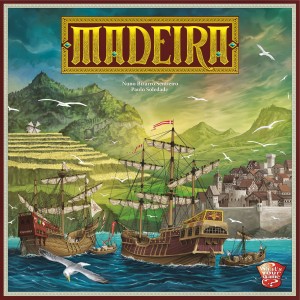Spiel 2013 Preview: Madeira
Posted by James (admin) on October 11th, 2013
 What’s Your Game have released some excellent games like Vasco de Gama and last year’s superb (and undeservedly less-known) Oddville. This year they are releasing Madeira which looks a like a very meaty eurogame with many elements that you need to balance.
What’s Your Game have released some excellent games like Vasco de Gama and last year’s superb (and undeservedly less-known) Oddville. This year they are releasing Madeira which looks a like a very meaty eurogame with many elements that you need to balance.
In essence, players select a group of action dice and use these on different characters and buildings to perform actions with their workers and ships (visiting fields on islands, colonies, cities and the city watch. However, this summary completely misses noticing all the many game mechanics and resources to balance. So, I’ll try to give a more detailed overview of the game which is played over 5 rounds.
At the start of each round, each player selects a row on the Guild Board which gives them 3 dice (the values have been rolled already), plus the player can also select one of the remaining Crown Request tiles in the same row (which can earn points a the end of some rounds). The row selected also determines turn order for the next phase, plus allows the player to make ready some guild favours (special abilities) if they have any matching ones.
Next, players take turns placing one of their dice (its value has been rolled already) on one of the 5 characters and take the associated action which move workers or ships to different areas of the board and/or gain resources. (Amongst other things, the board shows 5 buildings and each has a character on it. The characters change/move a bit during the game.) Players with workers in the city watch can use one to place a pirate dice instead of their action dice to give them an extra go and this has other effects later too. Placing low values in some regions may cost bread. When finished placing dice, they pass and select any one of the remaining turn order slots (which gives a special benefit too).
Next, the buildings are resolved in order. Each player that placed at least 1 action dice (not a pirate dice) on the character on a building gets to take the building’s action if they have workers in the right areas. Actions are things like gaining bread, moving workers, etc. However, it costs cash to take an building action (10 cash minus the total of the dice placed on the building). If the player can not afford to pay the cost, they gain pirates (more if there are pirate dice on the building) which can cost players points at the end of the game.
Players then receive various resource incomes, as well as feed their workers and maintain their ships. Finally, at the end of the 1st, 3rd and 5th rounds, players can score 1, 2 and 3 of their Crown Request tiles (respectively). Remember players pick/gain a Crown Request tiles at the start of each round when selecting dice and each of these describe how they are scored.
Even that description is still an overview but, hopefully, it conveys the basics. None of the game mechanics are complicated in themselves and the board, which looks great, has lots of good icons to guide things. Each player may score points on different ways (Crown Requests)and may have different special abilities (Guild Favours) so will have a slightly different perspective of the game (which I like) but they use the same locations and it seems like player interaction will be high to use the limited resources/locations. It will probably take the first round or two to understand the different areas of the game, but I think Madeira looks like a very interesting eurogame with plenty of meat and decisions to it. Definitely looking forwards to this one.
You can read the rules and see lots of details about the game on Madeira’s web site: bga.me/madeira
James.



October 11th, 2013 at 3:26 pm
Thanks a lot for the preview. Hope you enjoy the game.
Paulo
October 12th, 2013 at 2:42 pm
Hi Paulo,
No problem. I’m looking forwards to trying the game out.
Cheers,
James.